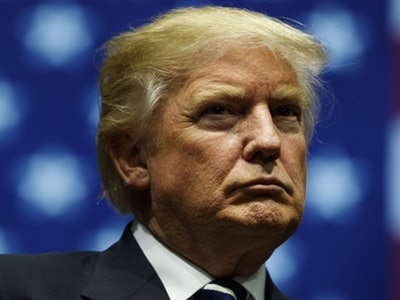While Democrats ushered out Republican John Kasich as their featured speaker at their virtual convention last week, Republicans turned to Georgia State Representative Vernon Jones, a Democrat, to issue an impassioned plea for the reelection of Donald J. Trump.
 President Donald J. Trump
President Donald J. TrumpIn his address, Jones—a graduate of North Carolina Central University—praised the Trump administration for its support of historically Black colleges and universities.
“For generations, HBCUs have been the breeding ground for Black scholars in math, science, religion, engineering and politics,” said Jones. “They have been important springboards for Black success ever since. But Democrats haven’t treated them like that.”
Indeed, the Trump administration is looking to tout its support for HBCUs as one of its signature achievements over the past three and a half years. During a speech at Benedict College last year, Trump praised his administration for its financial support of HBCUs and for low unemployment rates for African Americans, making multiple references to the 2020 election.
“When I’m up on the debate stage with one of these characters, whoever it may be, and I rattle off a couple of those stats, I don’t know how they’re going to beat me,” he said. “They’re going to have to be awfully good. They’re going to have to be awfully good.”
And while some political observers praise Trump for his outward support of HBCUs, including signing legislation that cemented additional funding for many of these institutions, it is unlikely that the faculty, staff and students attending these institutions will show up in mass numbers in November to vote for him again.
“There is little indication that he will be able to capture a sizeable portion of the HBCU vote despite the outreach,” said political consultant, Dwayne Smith. “While many HBCUs are culturally conservative, the students who attend these institutions and the professors who teach at them are likely more entrenched in the Democratic Party .”
And the recent announcement of Senator Kamala Harris—a graduate of Howard University— as Joe Biden’s running mate, may have overshadowed any additional mileage that Trump was hoping to get from his public embrace of these institutions.
“It’s one thing to symbolically support HBCUs,” said Smith. “But with Kamala Harris, you get someone who not only talks about HBCUs in some abstract way, but who can share personal stories and experiences about why she decided to attend one. That is quite powerful.”
Despite the reference to HBCUs during the gathering this week, there were several noticeable absences when it came to higher education. There was little discussion about the free college movement, which has generated widespread traction in conservative states like Tennessee and Kentucky. Also, Betsy DeVos—the controversial U.S. Secretary of Education—was not among the speakers.
If Trump is reelected, it is unclear if DeVos will stay for a second term. During a question-and-answer session at the Education Writers Association national seminar in Baltimore last year, DeVos declined to commit to serving another four years.
















